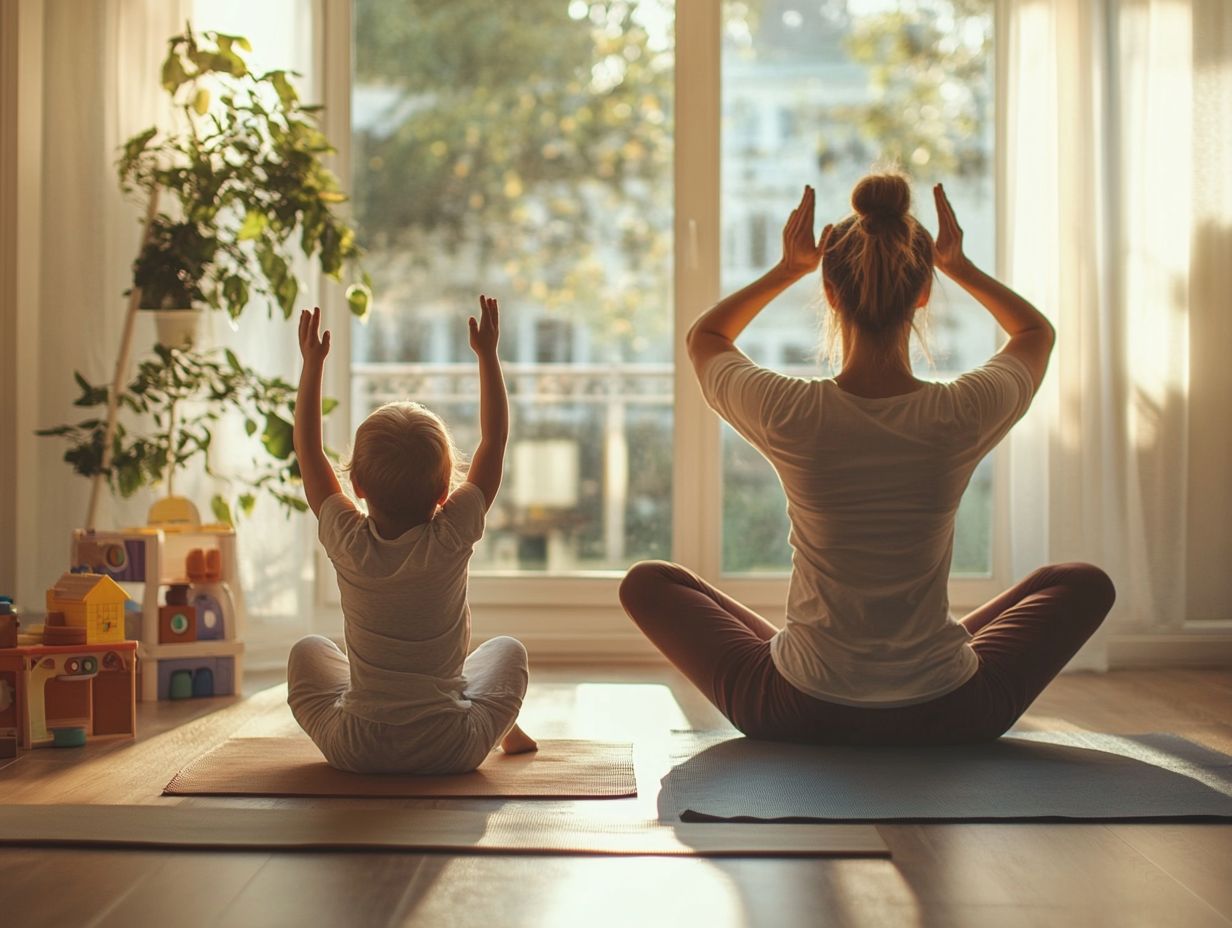How to Balance Parenting and Personal Wellness
Parenthood is a journey that can be both rewarding and demanding, often leaving you with scant room to focus on your own well-being.
Amid the whirl of daily responsibilities, it s essential to acknowledge the significance of self-care not just for your health, but for the well-being of your children as well. Practicing strategies like mindful self-care can make a significant difference.
This conversation delves into the importance of balancing parenthood with personal wellness, the challenges that frequently arise in this endeavor, and practical strategies to nurture both your family and yourself, including self-care and realistic goals.
Embrace the notion that prioritizing self-care can pave the way for a happier, healthier home for everyone involved.
Contents
- The Importance of Balancing Parenting and Personal Wellness
- How Does Balancing Parenting and Personal Wellness Benefit Children?
- Challenges of Balancing Parenting and Personal Wellness
- Time Constraints
- Financial Constraints
- Guilt and Societal Pressure
- Tips for Balancing Parenting and Personal Wellness
- Additional Resources
- Frequently Asked Questions
- 1. How can I balance parenting and personal wellness without feeling overwhelmed?
- 2. What are some self-care activities that can easily fit into my busy parenting schedule?
- 3. How can I involve my children in my personal wellness routine?
- 4. What steps can I take to reduce stress and maintain my own well-being while raising children?
- 5. How can I make time for myself when my children demand so much of my attention?
- 6. What should I do if I feel like I am failing at balancing parenting and personal wellness?
Key Takeaways:

- Prioritize self-care as a parent to maintain physical and mental well-being, which ultimately benefits both you and your children.
- Understand and address the challenges of balancing parenting and personal wellness, such as time and financial constraints, guilt, and societal pressures.
- Take proactive steps to achieve balance, including setting realistic expectations, creating a support system, practicing mindfulness, delegating tasks, and making time for quality family time.
Start your self-care journey today to create a nurturing environment for your family.
The Importance of Balancing Parenting and Personal Wellness
Balancing parenting with personal wellness is essential for nurturing your emotional well-being and mental health. The journey of parenthood can often feel like an overwhelming set of responsibilities. This balance helps in harmonizing responsibilities and avoiding overwhelm.
You encounter daily challenges that demand effective time management strategies. These strategies allow you to create a harmonious family environment while also pursuing your personal interests. Effective time management can help balance personal passions and family duties.
Research from experts, including valuable insights from the American Academy of Pediatrics, underscores the significance of self-care in achieving equilibrium amid the chaos of parenting.
By prioritizing your emotional health, you position yourself to tackle stressors more effectively and carve out quality time with your children. This ultimately strengthens your relationships and enhances your overall well-being. This method supports the development of effective habits, as noted by James Clear.
Why is it Important to Prioritize Self-Care as a Parent?
Prioritizing self-care as a parent is not just important; it’s essential for combating that nagging mom guilt and nurturing a sense of self-compassion. When you focus on your own well-being, you can break free from the cycle of self-criticism that often shadows the parenting journey.
Establishing a personal self-care routine can be a game-changer. Simple practices like carving out time for your favorite hobbies, savoring quiet moments with a captivating book, or engaging in invigorating physical activities can dramatically boost your emotional health and bring joy to your life.
Incorporating mindfulness techniques, such as meditation or deep-breathing exercises, can elevate your mental clarity and enhance your overall satisfaction with life. By acknowledging your own needs and taking proactive steps toward self-care, you cultivate a healthier mindset, ultimately benefiting not only yourself but also your entire family. For instance, holistic habits like yoga can significantly reduce anxiety and exhaustion.
How Does Balancing Parenting and Personal Wellness Benefit Children?
Balancing parenting and personal wellness not only enriches your life but also significantly benefits your children, enhancing their emotional well-being and nurturing healthy relationships. This balance can be achieved through strategies like the Four Burner Theory, which suggests that in order to thrive, you must prioritize different areas of life like family, work, health, and friends.
When you prioritize your own health both mental and physical you create a nurturing environment that allows your children to flourish. For example, when you manage stress effectively, you become more capable of engaging in meaningful conversations and activities with your children, fostering stronger bonds and deeper emotional connections. This approach is supported by research from child psychologists.
Healthier parents often model effective coping strategies, teaching their kids resilience during challenging times. This positive dynamic can lead to children developing better social skills, as they observe and learn how to interact with others in supportive ways, ultimately contributing to their overall emotional intelligence and adaptability in various social situations. Engaging in community events, like those organized by Tots World at Walton Hall Farm, can help in developing these skills.
Challenges of Balancing Parenting and Personal Wellness
The challenges of balancing parenting and personal wellness can often leave you feeling overwhelmed. As you navigate the complexities of time constraints, financial limitations, and societal pressures, it s easy to feel overwhelmed by guilt as a parent.
Time Constraints

Time constraints pose a significant barrier for you as a parent trying to prioritize self-care, often leaving you feeling overwhelmed and on the brink of burnout.
In the whirlwind of daily routines packed with work obligations, school activities, and household tasks, it s easy to overlook your well-being. Implementing effective time management strategies can help carve out precious moments for yourself amidst the chaos.
Simple practices, like creating a prioritized to-do list or delegating tasks, can dramatically shift the balance in your favor. Setting aside just one dedicated hour each week for personal pursuits whether it s diving into a good book, engaging in some invigorating exercise, or simply unwinding can nourish your mind and rejuvenate your spirit.
It s crucial to recognize that taking time for self-care benefits not only you but also sets a positive example for your children, instilling the importance of a healthy lifestyle within your family.
Financial Constraints
Financial constraints can create significant hurdles for parents looking to invest in self-care practices that enhance emotional and mental well-being. However, you ll be pleased to discover that there are numerous cost-effective strategies you can seamlessly incorporate into your daily routine without stretching your budget.
Consider simple yet effective activities such as taking a short walk in nature, joining local community groups, or practicing mindfulness through free apps. Just a few simple actions can bring you major relief from stress.
Community centers provide free workshops, support groups, and resources to help you build a self-care regimen.
Don’t miss out on local libraries they often offer fantastic free classes! Engaging with nonprofits dedicated to wellness can also enable you to prioritize your mental health without financial strain. Sunshine City Counseling in St. Petersburg, FL, offers various resources that can help you build a sustainable self-care routine.
Guilt and Societal Pressure
Mom guilt and societal pressure can create significant obstacles for you as a parent, making it challenging to maintain a sense of self and prioritize your emotional well-being. Mindful self-care practices can significantly reduce these pressures.
These pressures often arise from the unrealistic expectations perpetuated by social media, family dynamics, and traditional norms, which imply that successful parenting requires absolute dedication and self-sacrifice. As a result, you may find yourself ensnared in a relentless cycle of self-doubt and guilt whenever you take a moment for yourself or make choices that prioritize your own needs.
To counter these negative feelings, it’s essential to cultivate self-compassion being kind to yourself during tough times. This practice encourages you to acknowledge your struggles and imperfections without judgment. By embracing this mindset, you can challenge the negative self-talk fueled by societal expectations, ultimately paving the way for a more balanced and fulfilling parenting journey.
Tips for Balancing Parenting and Personal Wellness
To successfully balance parenting and personal wellness, you can implement effective strategies that prioritize self-care, set realistic goals, and foster open communication within your family. These strategies help you avoid overwhelm and maintain life balance.
Making self-care an essential part of your routine enhances your well-being and creates a positive environment for your children. Setting achievable goals helps you avoid overwhelm, allowing you to focus on what truly matters.
Encouraging open communication within your family nurtures strong relationships, ensuring everyone feels heard and valued. Together, these approaches lead to a harmonious balance between your responsibilities as a parent and your personal wellness.
Start today by picking one strategy to implement and watch the positive changes unfold!
1. Prioritize Self-Care
Prioritizing self-care is absolutely crucial for maintaining your emotional health and mental well-being. It enables you to show up fully for your family.
By embracing practices like mindfulness, regular exercise, and indulging in simple hobbies, you can create a buffer against daily stressors. Engaging in activities that bring you joy whether it s diving into a good book, tending to your garden, or exploring a creative outlet significantly enhances your mood and resilience.
Taking time for self-reflection or meditation elevates your emotional intelligence, allowing for better communication and connection with your children. Establishing personal rituals, such as a serene morning routine or a weekly outing with friends, fosters a greater sense of balance in your life.
Through these self-care strategies, you not only find relief from the pressures of parenting but also cultivate a deeper sense of life satisfaction, ultimately benefiting the entire family dynamic. Consider exploring the Four Burner Theory to understand how to balance your family, work, health, and personal life more effectively.
2. Set Realistic Expectations

Setting realistic expectations is essential for sidestepping feelings of overwhelm and cultivating a balanced approach to both parenting and self-care.
When you step back and evaluate your current commitments and responsibilities, you can prioritize tasks that resonate with your family values and personal well-being. By breaking down larger goals into smaller, manageable steps like carving out just 30 minutes a day for your personal interests or designating specific time for family activities you foster a sense of accomplishment without stretching yourself too thin. James Clear, the author of “Atomic Habits,” suggests starting with small, attainable goals to build momentum.
Regularly check in with yourself to avoid overcommitting, ensuring that you have the emotional and physical energy to thrive both personally and as a caregiver.
3. Create a Support System
Creating a strong support system is key to fostering effective communication and enhancing relationships, both of which are vital for achieving balance in your parenting journey and personal wellness.
By surrounding yourself with understanding individuals, you can navigate the challenges of raising children with increased resilience. Building meaningful connections with family, friends, and local community resources is essential. You might consider joining local parenting groups or classes, which not only sharpen your skills but also help you bond with others who face similar challenges.
Regular check-ins with trusted friends can offer a safe space to share your experiences and feelings, providing the encouragement you need. Additionally, utilizing community services like childcare cooperatives or family support programs helps you cultivate a robust network of support that enriches both your parenting and personal well-being.
4. Practice Mindfulness
Practicing mindfulness as a form of self-care can profoundly elevate your emotional well-being, reducing anxiety while fostering a deeper awareness of the present moment.
For parents, weaving mindfulness techniques into daily life can be truly transformative. Consider dedicating a few minutes each morning to deep breathing or mindful meditation; these simple practices can help cultivate a serene state of mind. Engaging in activities like mindful walking where you focus on each step and the sensations around you can further reinforce this essential practice.
Apps such as Headspace or Calm can offer guided sessions specifically designed for busy parents, helping you carve out time in your hectic schedule. Even renowned authors like David Sedaris have explored the benefits of mindfulness in their writings.
By integrating these exercises into your daily routines, mindfulness becomes an innate part of life, enriching not only your personal health but also creating a calm atmosphere for your entire family.
5. Make Time for Quality Family Time
Making time for quality family moments is vital for strengthening relationships and ensuring that both you and your children can enjoy shared experiences.
These moments lay the groundwork for open communication and understanding, fostering an environment where everyone feels valued and connected. Whether you re cooking a meal together, exploring the great outdoors on a nature hike, or engaging in a spirited board game, the emphasis should be on creating meaningful interactions rather than simply clocking hours.
Participating in conversations during these shared activities allows family members to express themselves, share laughter, and craft cherished memories that greatly enhance emotional well-being. Truly, it s these small yet impactful experiences that establish the foundation for healthy family dynamics and mutual joy.
6. Seek Professional Help if Needed
Recognizing when to seek professional help is a proactive step that can greatly enhance your emotional well-being and address any mental health concerns you may face. This awareness is not just vital for your individual health, but it also plays a key role in creating a stable environment for your children.
Stressors can often impact your ability to provide the emotional support your children need. Understanding when it’s time to reach out for help can significantly reduce the risk of long-term issues, fostering a healthier family dynamic.
Utilizing resources such as mental health services, counselors, and child psychologists can be invaluable in this journey. These professionals, often affiliated with institutions like Harvard University, can offer you tailored strategies that cater to your family’s specific needs, equipping both you and your children to navigate emotions and behaviors more effectively.
Additional Resources

Here are some valuable resources to enhance your journey of balancing self-care and parenthood, with a keen focus on emotional health and mental well-being.
This carefully curated collection includes insightful articles from reputable parenting websites that explore effective self-care techniques, alongside practical guides aimed at nurturing emotional resilience. You ll also discover expert-reviewed books packed with evidence-based strategies, endorsed by organizations such as the American Academy of Pediatrics.
Consider exploring online courses that specialize in mindfulness and stress management, along with professional services like therapy and counseling, which underscore the significance of mental health. By utilizing these resources, you can arm yourself with the essential tools to not only promote your own well-being but also create a happier and more nurturing environment for your children.
Frequently Asked Questions
1. How can I balance parenting and personal wellness without feeling overwhelmed?
The key is to prioritize your time and make self-care a non-negotiable part of your routine. Set realistic expectations for yourself and don’t be afraid to ask for help from family and friends.
2. What are some self-care activities that can easily fit into my busy parenting schedule?
Simple activities like taking a walk, reading a book, or even just a few minutes of deep breathing can make a big difference. Look for small pockets of time throughout your day to focus on yourself.
3. How can I involve my children in my personal wellness routine?
Get creative and find ways to include your children in your self-care activities. You could go for a walk together, do yoga or meditation as a family, or even have a spa day at home with homemade face masks and nail painting.
4. What steps can I take to reduce stress and maintain my own well-being while raising children?
Communication is key in any relationship, including the one with your children. Set boundaries, communicate openly and honestly, and don’t be afraid to take breaks when needed. Also, try to find moments of joy and gratitude in your daily life.
5. How can I make time for myself when my children demand so much of my attention?
Remember that taking care of yourself is not selfish and it ultimately benefits your children. Schedule “me time” into your daily or weekly routine, even if it’s just for a few minutes. And don’t feel guilty about it!
6. What should I do if I feel like I am failing at balancing parenting and personal wellness?
Be gentle with yourself and understand that balance is not always achievable. It’s okay to have days where things don’t go as planned. Just take a deep breath, reassess your priorities, and try again tomorrow.






